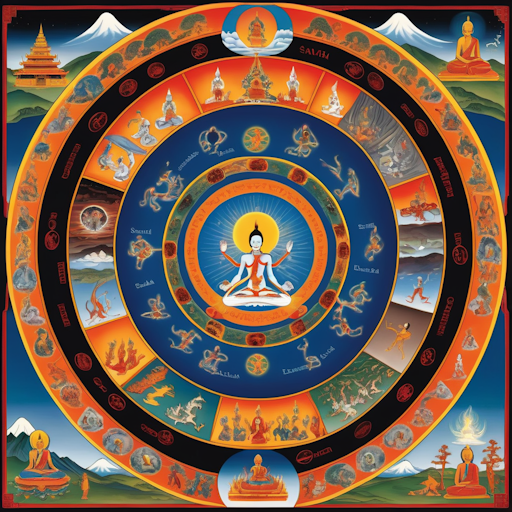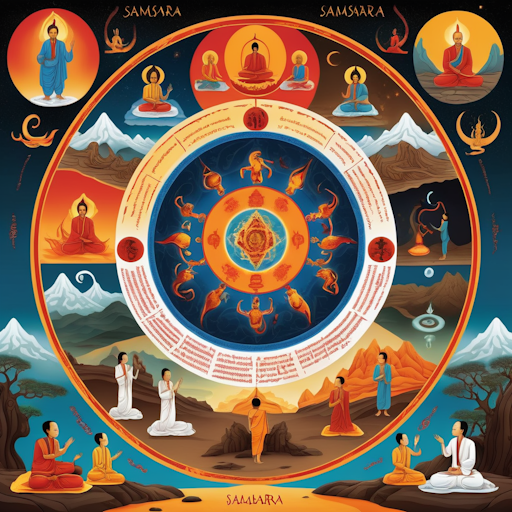Karma is a fundamental concept in Buddhism, a religion and philosophical system that traces its origins to ancient India. This concept is often misunderstood or oversimplified in popular culture, but in Buddhism, it holds a profound and intricate significance. Karma is intimately connected to the idea of rebirth and has a profound impact on the way Buddhists approach life. In this article, we will delve into the definition and explanation of karma, understand its role in rebirth, and explore how one can generate positive karma in daily life.
Definition and Explanation of Karma
Karma, derived from the Sanskrit word “karman,” which means “action” or “deed,” is a core concept in Buddhism. It refers to the idea that every action, whether physical, verbal, or mental, has consequences, and these consequences are not limited to the immediate effects of the action. Instead, they extend beyond a single lifetime, shaping one’s future experiences in a continuous cycle of cause and effect. Karma is often likened to a cosmic ledger in which all our actions are meticulously recorded, and we will eventually reap the results, be they positive or negative.

Karma operates based on the principle of cause and effect, with actions giving rise to corresponding results. Positive actions lead to positive outcomes, while negative actions result in adverse consequences. This concept encourages personal responsibility and accountability, as individuals are seen as the architects of their own destiny. Buddhists believe that every intention and action leaves an imprint on the mind and influences the course of one’s life.
It’s crucial to understand that karma is not a deterministic system, but rather a dynamic one. While actions have consequences, there is room for change and growth. Buddhists believe that it’s possible to modify the trajectory of one’s karma by cultivating awareness and making positive choices.
Understanding Karma’s Role in Rebirth
One of the most distinctive aspects of Buddhism is its view of life as a continuum that transcends a single existence. The concept of rebirth, or reincarnation, is closely intertwined with karma. In Buddhism, it is believed that the cycle of birth, death, and rebirth, known as samsara, is governed by karma. This cyclical process continues until an individual attains enlightenment and breaks free from it.
Karma plays a pivotal role in determining the circumstances of one’s rebirth. The nature of one’s actions in previous lives influences their future existence, including their physical and mental attributes, the environment they are born into, and the challenges they will face. Positive karma can lead to favorable circumstances in the next life, while negative karma can result in difficult or adverse conditions.

This understanding of karma and rebirth adds a profound layer of complexity to the Buddhist worldview. It suggests that one’s current life is not merely the result of random chance or external forces but is, in part, a product of their own past actions. Consequently, Buddhists strive to live mindfully and ethically, as they believe that their present actions will influence their future lives.
In the realm of rebirth, the ultimate goal in Buddhism is to break free from the cycle of samsara and attain Nirvana, a state of ultimate liberation and enlightenment. Achieving Nirvana signifies the end of suffering and rebirth, allowing one to transcend the limitations of karma.
How to Generate Positive Karma in Daily Life
Generating positive karma in daily life is a central tenet of Buddhist practice. It involves living in alignment with the principles of ethical conduct, compassion, and mindfulness. Here are some ways in which individuals can cultivate positive karma:
- Ethical Conduct (Sila): One of the foundational elements of generating positive karma is adhering to ethical principles. The Five Precepts, a set of moral guidelines, are often followed by Buddhists to promote virtuous behavior. These precepts include refraining from harming living beings, stealing, engaging in sexual misconduct, lying, and consuming intoxicants. By following these guidelines, individuals avoid creating negative karma and promote harmony and well-being.
- Compassion (Metta): Compassion is a key aspect of Buddhism and a powerful tool for generating positive karma. Practicing metta, or loving-kindness meditation, allows individuals to cultivate a deep sense of empathy and goodwill toward all beings. By actively wishing for the happiness and well-being of others, individuals create positive mental states and accumulate positive karma.

- Mindfulness (Sati): Mindfulness is a practice that helps individuals become aware of their thoughts, emotions, and actions. By cultivating mindfulness, individuals can make conscious choices that lead to positive outcomes. Mindfulness allows individuals to break free from unwholesome habits and reactions, enabling them to create positive karma.
- Generosity (Dana): Giving without attachment and with a pure heart is another way to generate positive karma. Acts of generosity, whether through material gifts, time, or support, foster a sense of selflessness and interconnectedness with others. This leads to the accumulation of positive karma and the development of a generous spirit.
- Meditation and Contemplation: Regular meditation and contemplation practices can help individuals gain insights into the nature of their actions and their karmic consequences. By introspecting and examining one’s thoughts and behaviors, individuals can make conscious choices that align with their spiritual goals.
By incorporating these practices into their daily lives, individuals can create an environment where positive karma accumulates, gradually shaping their future in a more favorable way. In this manner, Buddhists believe that they can work toward achieving enlightenment and ultimately liberate themselves from the cycle of rebirth.
In summary, the concept of karma in Buddhism is a profound and multifaceted idea that encompasses the principles of cause and effect, ethical conduct, and the cycle of rebirth. Karma is inextricably linked to an individual’s actions and intentions, influencing their present life and future existences. By understanding the intricate interplay of karma and rebirth and actively working to generate positive karma through ethical conduct, compassion, mindfulness, and generosity, Buddhists aim to cultivate a path to enlightenment and liberation from the cycle of samsara.
Buddhism offers a unique perspective on the concept of karma, presenting it as a dynamic force that individuals can shape through their choices and actions. By living in accordance with these principles, practitioners seek to accumulate positive karma and ultimately break free from the cycle of samsara to attain the ultimate goal of Nirvana.
Intricately woven into the fabric of Buddhist philosophy, karma serves as a constant reminder of the importance of mindful living and ethical behavior. By embracing these principles, individuals can navigate the complex web of karma and, in doing so, find a path to lasting peace and spiritual fulfillment.
External Links:
- Buddhism – Karma and Rebirth
- The Buddhist Center – Understanding Karma
- Stanford Encyclopedia of Philosophy – Buddhist Ethics
These external resources offer further insights into the concept of karma in Buddhism and its broader philosophical and ethical implications.